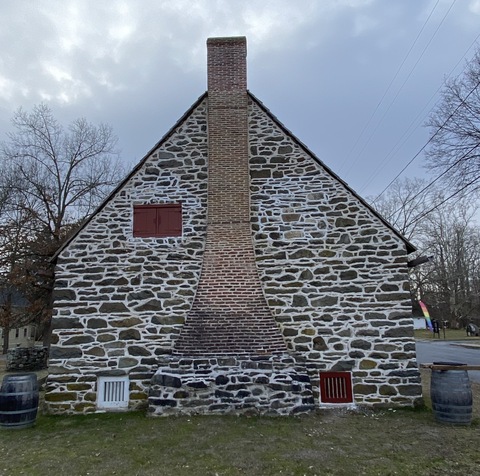
A stone house on Historic Huguenot Street. The grills at the bottom vented the slave quarters in the basement.
Photo © Carol Bergman
Violence never brings permanent peace. It solves no social problem: it merely creates new and more complicated ones.
-Martin Luther King Jr. Nobel Peace Prize Acceptance Speech December 10, 1964
The capacity of human beings to think up new ways to kill one another proved inexhaustible, as did our capacity to exempt from mercy those who look different or pray to a different God.
-President Barack Obama's Nobel Peace Prize Acceptance Speech, December 10 2009
I've been listening to Martin Luther King Jr.'s and Barack Obama's Nobel Peace Prize acceptance speeches—available on the Nobel site. The speeches are biblical in their exalted intensity, though Obama's is sometimes grounded in descriptions of the particular challenges his administration was confronting. Although he sometimes sounded like a preacher, he was not a preacher; he was a politician. King was a schooled preacher, then and now an unsurpassed orator. Both men led their flock to activism and hope.
I thought of both of them today after receiving texts and emails from friends in New Paltz about a disturbing incident that took place just steps away from my home. It has not, as yet, been officially designated a hate crime—motivation must be established—and the perpetrator is at large, but it feels and looks like one to me. Indeed it is reminiscent of the swastikas scrawled on Jewish businesses and homes in Germany as Hitler rose to power.
Here is an excerpt from Terence Ward's report in the October 10 issue of Hudson Valley One:
The New Paltz town council member was setting off to drop [Esi] Lewis' nine-year-old at school when the pair saw the graffiti scrawled in dark spray paint on their house, which included crude sexual imagery, a profane instruction regarding an intimate act, and that nine-year-old's name. They were both deeply disturbed, Lewis confirmed. "We are afraid to be home."
An image of the "graffiti"—a regrettable use of the word as it implies street art—appeared in the paper. I won't use it to illustrate this blog post, for obvious reasons.
Just a word about Esi Lewis—a lawyer, the DEI officer for Ulster County, a member of the Town Board, a devoted parent, and the President of the evolving Margaret Wade Lewis Cultural Center in New Paltz, named after her mother, a founding faculty member of the Black Studies Department at SUNY New Paltz. Indeed, none of my description fully describes Esi's energy and devotion to the town where she was born and raised; she made a conscious decision to return here. As a parent, I cannot imagine what it must have felt like to see the verbal attacl on her home with her child in tow.
I have interviewed Esi, and crossed paths with her at various events over the years. I trust her deeply-felt concerns about racism in this ostensibly "liberal" town. When I first arrived here in 2018, there was little recognition of the history of enslavement, for example, or the legacy of Jim Crow after emancipation. Much has changed in the intervening years, and awareness is evolving, particularly on Historic Huguenot Street where signage of stone houses with their slave quarters has been updated.
"People of color are afraid to be involved in public life…We are not honest as a community about racism — it's a real problem. This country was built and founded on racism. We are not immune," Esi told Terence Ward.
I reflect on this dissonant reality often, especially in the current fraught social media-driven climate. The breakdown of civil discourse, the cruelty we witness every day with round-ups and deportations, is inflammatory. Those who hate have been given permission to speak their hatred aloud, or to act on it. Peaceful existence and co-existence cannot be achieved, or re-established, in such an unsettling and unsafe climate.
To understand a working definition of hate speech, and the best protocols to counter its potentially violent effects, consult the UN's Fact Sheet: https://www.un.org/sites/un2.un.org/files/notohate_fact_sheets_en.pdf
